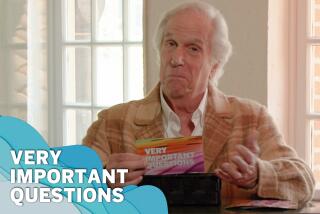Moscow 2042 by Vladimir Voinovich; translated by Richard Lourie (Harcourt Brace Jovanovich: $17.95; 377 pp.)
In 1982, a Russian emigre writer living in Stockdorf, West Germany, bought an expensive airline ticket and flew back to the Soviet Union via Lufthansa. The writer, Vitaly Kartsev, bore a striking resemblance to Vladimir Voinovich, a Russian emigre writer living in Stockdorf, West Germany.
Kartsev’s ticket was more expensive than an ordinary flight from Germany to the Soviet Union because it involved traveling 60 years into the future as well as the miles from Munich to Moscow.
Once in the future, Kartsev finds himself welcomed as a hero. A society in which state, party and church have merged regards him as a cultural witness and validation of itself.
But--alas!--the copies of Kartsev’s works that he has brought with him are seized and suppressed. The only work for which he is known is one he has not yet written, and the state demands that Kartsev make some changes in it. Just a few little changes. But they must be made to assure the political correctness of the book.
This world of the future is a hopelessly corrupt, hypocritical bureaucracy. The only hope of its residents is its inefficiency. To the extent that the system does not work, the people who live beneath it can survive, and their society can endure. If ever the system worked, it would collapse.
Voinovich projects his alter ego, Kartsev, into a crazy-house world in “Moscow 2042,” but quickly it becomes obvious that Voinovich has no intention of portraying any real tomorrow. His Moscow of the future is actually a nightmare image of the Soviet Union in Voinovich’s time.
He addresses the question himself.
“Science fiction writers have not only foreseen technological discoveries but the evolution of modern society toward totalitarianism,” he has a companion tell Kartsev. “Take Orwell, for example. Didn’t he predict in detail the system that exists in Russia today?”
“Of course not,” Kartsev/Voinovich replies. “Orwell wrote a parody of what already existed at the time. He described a totalitarian machine that worked perfectly and could simply never exist in a real human society. Take the Soviet Union--its population only displays an outward obedience to the regime; in fact, people have nothing but contempt for the slogans and catch phrases. They respond by working poorly, drinking heavily, and stealing left and right. Big Brother is the target of ridicule and the subject of endless jokes.”
Voinovich’s pictures of Soviet society and its foibles are wildly funny, but by no means kind. He dwells at length on the “Moscowrep’s” (Moscow Republic’s) dealings with its own citizens and the citizens of surrounding satrapies.
Commerce takes place in the main through the exchange of “primary matter” (food) for “secondary matter” (human waste). Moscowrep is a heavy importer of primary matter and exporter of secondary matter. Main cafeteria fare is an unappetizing mixture called vegetarian pork.
Literature is created collectively. Junior-grade writers sit in ranks at computer keyboards that feed into a common data bank from which nothing ever emerges. Senior writers have a similar arrangement, but their works are merged and edited into a never-ending flow of “Genialissimoiana,” works in praise of or to be attributed to the supreme dictator, the Genialissimo, who lives in an orbiting space station.
Meanwhile, lurking off stage is an old acquaintance of Kartsev’s, Karnavalov. It doesn’t take a genius to recognize Voinovich’s colleague Alexander Solzhenitsyn in Kartsev’s colleague Sim Simych Karnavalov. Like Solzhenitsyn, Karnavalov has moved to New England and established an old-fashioned Russian enclave, and turns out a series of literary works so huge that they are called “slabs” rather than books.
In the end, “Moscow 2042” evolves (it would be unkind to say degenerates) from satire through parody and into farce, with a future Russia crowning a new czar and plunging headlong into the Middle Ages.
What is one to make of all this?
Here in the West, it is generally held that art and propaganda are not necessarily synonymous. The novelist may be trying to advance a position, or he may be purely a reporter--or an entertainer. “Moscow 2042” has merit as entertainment, but Voinovich is clearly reporter and propagandist as well, however exaggerated the images he creates.
In an earlier, nonfiction book, “The Anti-Soviet Soviet Union,” Voinovich expressed himself more directly.
“In Mikhail Gorbachev a new generation has come to power. Even if it proves in no way better than its predecessor, it will be bad in its own way. An era has come to a close, one that lasted from the death of Lenin to our own times.”
He continues: “There is a large difference, and one of principle, between Lenin and Stalin. Lenin tried to achieve utopian ends by criminal means. To a significant extent, Lenin’s Party (which had begun to fall apart even while he was still alive) was composed of cruel, dull-witted people, but people devoted to the ideals they advocated, decent in their personal lives, and even capable of self-sacrifice.
“Much more a realist than Lenin, Stalin brought ends and means into conformity, that is, he achieved criminal ends by criminal means. He wiped out everyone who resisted the achievement of those ends: peasants, workers, scientists, writers.”
In “The Anti-Soviet Soviet Union,” Voinovich expressed straight out all of the things that he expresses by metaphor, by distortion, by parable in “Moscow 2042.” He is purging himself of the nauseating “vegetarian pork” that he had to consume during his life in the Soviet Union.
More to Read
Sign up for our Book Club newsletter
Get the latest news, events and more from the Los Angeles Times Book Club, and help us get L.A. reading and talking.
You may occasionally receive promotional content from the Los Angeles Times.









